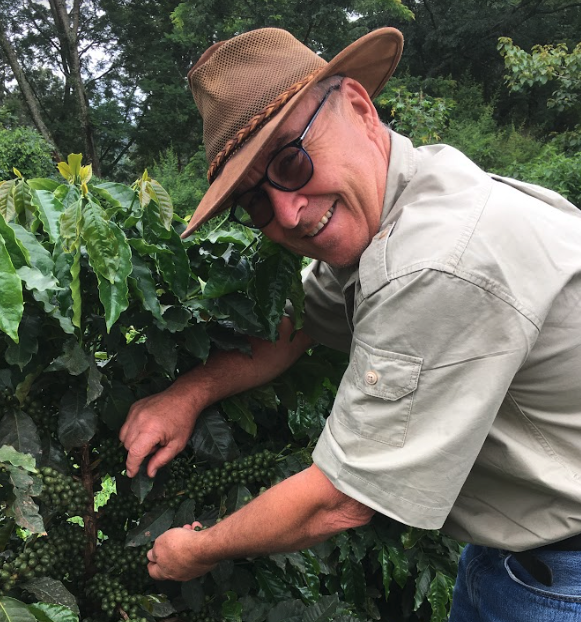
1400 metre above sea level, where the air is cool and clean, we discovered absolute tranquillity, upcountry vibes, waterfalls and all we ever wanted to know about these brown beans of pleasure.
Coffee, coffee, coffee as far as I can see. Rows of perfectly trimmed coffee bushes stretching out on wavy land at the foot of the impressive Mbeya range in Southern Tanzania. Did I know that the term coffee beans is actually wrong for the most important ingredient in almost everbody’s favourite morning drink? “In reality they are berries”, tells me Aggrey Nyange, long time loyal field manager of the Utengule coffee farm. I had flown in at midday, joyfully escaping Zanzibar’s relentless heat, and noticed thousands of silver dots from above. Coming closer they turned out to be shiny rooftops of local houses scattered on the green hills.

Upcountry life surely looks and feels different. “It rained the whole night”, welcomes me manageress Debbie Bacon, who has been running Utengule lodge – the traveller’s wing of the coffee farm - for several years. 1400 metre above sea level, warm summers and fresh winters perfectly combine with seasonal rains here. The landscape of dead volcanoes, rivers, springs and waterfalls is a coffee growers’ paradise since more than a century.
The rustic, immaculately kept, bungalow-type lodge is a child of the 80s. A dining room winds around a living tree, chandeliers twinkle above an old-fashioned bar and capable bar man Timothy Richard, 24, surprises me with ever-new coffee cocktails such as “Espresso Martini”. While fresh red-and-green tablecloths are being laid out and a fire is lit in the open fireplace, the sun dramatically sets above the rift valley. Baobabs, orchids and rose bushes shimmer in the twilight, definitely orchestrated by a man with a green thumb in the lush garden around a generous swimming pool. I can hardly take my eyes of the view from the wooden terrace of my country-suite, one of 16 rooms at the lodge, but tomorrow is my early-rise coffee farm day.
Aggrey Nyange awaits me at the 300-hectar-farm, only a short drive away from the lodge, founded by Swiss missionaries in 1919. And so does the farm owner himself, Swiss-born Hans Faessler, a dedicated coffee gourmand, grower and trader since 38 years. His business has taken him all over the world. With his green safari hat and winning smile, Faessler looks like an actor straight from “Out of Africa”. Key figures are quickly gathered: Utengule produces every year around 130 to 150 tons of exquisite coffee. It is roasted in Dar es Salaam; 50 per cent for export, the other half for the local market, which is a distinct feature of Utengule. In many coffee-producing, southern countries of the world, the best coffee is going abroad leaving locals with mediocre instant coffee. Not here: “Our export and locally available coffee has the same quality”, Faessler says.
November to May is the rainy and therefore planting season in Utengule; May to August the fields spring to life when the red, ripe cherries are picked, washed and dried in the sun. After resting for two months, the coffee beans are roasted, blended and packed.
Coffee is a durable fellow.
Hundred-year-old plants are still productive, also in Utengule. Walking over to the nursery, Nyange explains that the farm’s high-quality Arabica seedlings are grown here without pesticides and fertilisers. “Snails are our worst enemy”, says the field manager. The trees around us are thickly covered with moss, vigilantly we cross tiny streams, trying to avoid slipping off improvised wooden footbridges. Gumboots are not a bad idea for a visit to Utengule!
We don’t meet many workers on the plantation now, but during harvest hundreds are hired. Harvesting is manual work; afterwards a wet mill of newest technology will pull the pulp of the berries and spit out clean beans into a water basin before they land on drying tables for several days. “It’s not the quantity which counts in African coffee, but the outstanding quality”, Hans Faessler explains to me.
Tanzania’s coffee ranks high on the world market. Especially the bourbon varieties, originating from Bourbon island (today La Reunion) and grown under shady trees at Utengule are renowned for their smooth flavour and just the right acidity. “Our soil is rich in minerals from volcanic eruptions millions of years ago”, Faessler explains. Excursions take visitors to crater lakes, waterfalls and game parks nearby. The coffee trader is proud that on his farm the quality and fertility of the soil has been sustained more than hundred years.
What’s so special about coffee?
“Coffee is, just as wine, a gourmet product associated with the pleasant sides of life”, the 64 year old answers with a tiny trace of a Swiss accent. “It’s a versatile and re-finable product just by cultivation and processing.” He first came to Tanzania as administrator and bought the farm in the 80s, when he added the lodge. In 2005 he opened the Zanzibar Coffee House with its beautiful rooftop, hotel and café in historic Stone Town. “Consistency and endurance”, Faessler says, is most important in a business with ever-changing prices, and for him that includes sustainable, favourable conditions for staff and the community.
For the rest of my time at the coffee farm, I drink cafe latte in the morning and “Vanilla Ice Coffee” after an afternoon swim in the garden. I eat “coffee-flavoured pulled pork” for dinner and have a Cappuccino-Amarula cocktail as sun-downer. At 6pm, at an altitude above the clouds, I am definitely high on coffee.
By Andrea Tapper